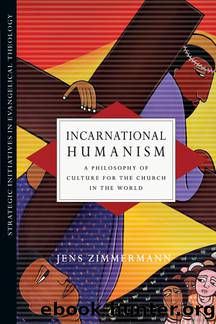Incarnational Humanism by Zimmermann Jens;

Author:Zimmermann, Jens; [Zimmermann, Jens]
Language: eng
Format: epub
Publisher: InterVarsity Press
Published: 2012-07-03T00:00:00+00:00
Gianni Vattimo: Incarnation Without Transcendence
Without a proper understanding of the incarnation, postmodern theologies overemphasize either transcendence or immanence. So far we have discussed postmodern theologians whose preoccupation with Godâs transcendence lets them neglect his presence. We now turn to a philosopher who succumbs to the opposite extreme of losing Godâs transcendence by focussing too much on Godâs presence in the world. The Italian philosopher Gianni Vattimo has tried to articulate a postmodern, post-Christian Christianity on the basis of the incarnation. Vattimoâs conflation of Heideggerâs hermeneutic ontology with the central Christian doctrine of the incarnation justifies and requires a deeply theological response to his basic question: âCan we really argue, as I believe we must, that postmodern nihilism constitutes the actual truth of Christianity?â Assuming âweâ refers to Christians, the short answer to this question is no, we cannot and must not.
Such a negative response to Vattimoâs question still concedes that his general project of an incarnational ontology is philosophically boldâperhaps reminiscent more of Hegel than of Joachim de Fioreâa move that offers important insights for thinking through the Westâs current cultural crisis.[181] Our cultural situation, as I have argued, seems characterized by the exhaustion of secular reason on the one hand and the return of religion, accompanied by the fear of fundamentalism and religiously motivated violence, on the other. Vattimo tries to articulate Christianity within this context and rightly stresses the interpretive nature of the Christian faith to forestall dogmatism, escapism and the churchâs segregation from the world.[182] To this end, Vattimo tirelessly points out the need for hermeneutic reflection not only within Christian belief but in all areas of political and civic life.
In equating weak thought with the essence of Christianity, Vattimo, much like his main sources Nietzsche and Heidegger, reacts against stifling cultural examples of Christianity, but fails to preserve the gift introduced into Western thinking by the Christian concept of the incarnation. This gift is the balanced correlation of transcendence with immanence, the alliance of divine otherness with human finitude, of radical difference with identity, and this gift has acted as a potent relativizer of absolute categories in Western thinking. Yet this relativizingâor as Vattimo might say âweakeningâ effectâdepends on maintaining a careful balance of transcendence and immanence. Vattimo loses this balance because, as so often happens in postmodern theologizing, he twists the biblical mystery to suit a prior, postmodern framework. Of course, as we have learned from hermeneutic philosophy, any truth requires mediation through a particular language and its concepts, and neither Christianity nor the biblical text is an exception to this rule. There is no âpureâ biblical message, free from particular historical context. Christianity has the essentially incarnational character of âa spiritual Reality becoming incarnate in the realm of senseâ that matures in history.[183] The hermeneutic character of the Christian faith does, however, have a guiding measure for interpreting Christianity through particular language and concepts. This normative measure is Christâs claims about himself, his self-interpretation in light of the Jewish history his teachings passed on
Download
This site does not store any files on its server. We only index and link to content provided by other sites. Please contact the content providers to delete copyright contents if any and email us, we'll remove relevant links or contents immediately.
Signature in the Cell: DNA and the Evidence for Intelligent Design by Stephen C. Meyer(2879)
Real Sex by Lauren F. Winner(2867)
The Holy Spirit by Billy Graham(2777)
The Secret Power of Speaking God's Word by Joyce Meyer(2754)
The Gnostic Gospels by Pagels Elaine(2399)
Jesus by Paul Johnson(2229)
Devil, The by Almond Philip C(2205)
23:27 by H. L. Roberts(2144)
The Nativity by Geza Vermes(2115)
Chosen by God by R. C. Sproul(2055)
All Things New by John Eldredge(2052)
Angels of God: The Bible, the Church and the Heavenly Hosts by Mike Aquilina(1870)
Angels by Billy Graham(1844)
The Return of the Gods by Erich von Daniken(1841)
Knowing God by J.I. Packer(1724)
Jesus of Nazareth by Joseph Ratzinger(1708)
Evidence of the Afterlife by Jeffrey Long(1705)
The Gnostic Gospel of St. Thomas by Tau Malachi(1680)
How To Be Born Again by Billy Graham(1670)
